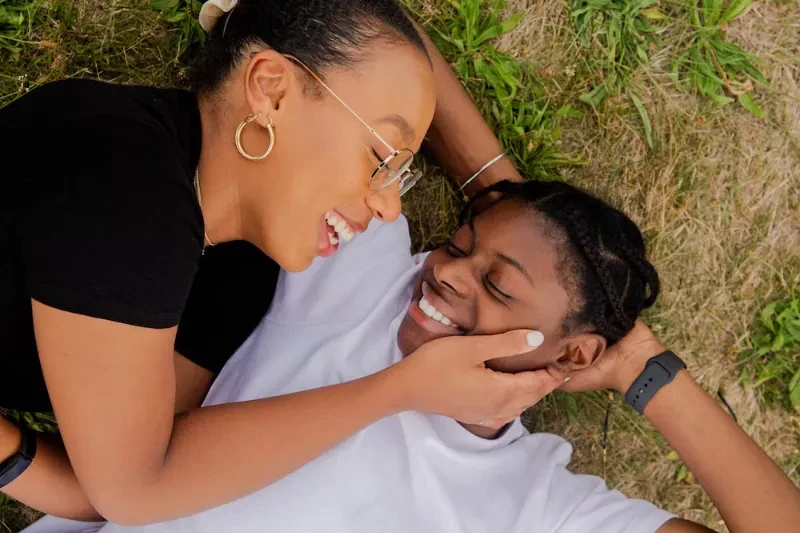- 0 Comments
- Views 54
Closure in a relationship is the essential feeling of acceptance that allows you to move on when a relationship ends. It plays a crucial role in the healing process after a breakup, helping you find peace and understanding. But what exactly is closure in a relationship? It refers to the need for a firm answer, eliminating ambiguity and accepting that the relationship is over.
The significance of closure cannot be overstated. It represents a turning point where your brain and heart come to understand that the relationship has ended. It ties up loose ends, provides explanations, and eliminates unanswered questions. Closure brings certainty and allows you to let go of the past, making room for new beginnings.
Having closure not only benefits your emotional well-being but also helps you grow as an individual. It gives you insight into what went wrong and enables you to avoid making the same mistakes in future relationships. Closure allows you to take responsibility for your part in the relationship breakdown and learn from it.
Read on to learn more about closure in relationships, and take the first steps towards your healing journey.
The Concept of Closure in Relationships
Closure in a relationship is an essential psychological process that allows individuals to come to terms with the end of a romantic connection. It involves finding acceptance,understanding, and resolution after the breakup. However, closure is not a one-size-fits-all concept. It varies from person to person,influenced by factors such as the nature of the relationship, how it ended, and individual experiences.
At its core, closure is about seeking answers and eliminating uncertainties. It’s about finding a sense of finality and moving on without lingering questions or doubts. Closure provides a deep sense of peace and allows both parties involved to close any emotional gaps or loose ends.
In order to achieve closure in a relationship, it is important to understand the key components involved:
- Understanding closure in relationships and its significance
- Different ways to get closure in a relationship
- Giving closure to an ex-partner
- The role of closure in healing after a breakup
- How closure contributes to future relationships
Imagine being left wondering why your partner suddenly disappeared without any explanation. The absence of closure can leave you feeling stuck and struggling to move forward. That’s why closure is important in a relationship. It offers clarity, allowing individuals to understand what went wrong and why the relationship came to an end.
Closure is like completing a chapter in your life story. It gives you the opportunity to reflect on your role in the relationship’s demise and learn from it. By gaining insight into your own actions and behaviors, you can grow as an individual and avoid repeating the same mistakes in future relationships.
Next, we explore why closure is vital in ending a relationship. Understanding closure in relationships and its significance will pave the way for achieving healing and growth after a breakup. So,let’s delve deeper into this crucial aspect of moving on after a relationship has ended.
The Importance of Giving Closure
Closure is not only vital for the person seeking it but also for the person giving it. When a relationship comes to an end,both parties involved can benefit greatly from the process of closure. It provides a sense of finality and certainty,allowing both individuals to move forward with their lives.
By giving closure, you are offering the other person the opportunity to find answers and understand what went wrong in the relationship. It gives them a chance to make sense of the breakup and find their own path to healing. Closure helps individuals learn from their mistakes and grow as they embark on future relationships.
Moreover, giving closure allows for the rewriting of life stories. It enables individuals to close the chapter on their former relationship and start fresh. By providing closure,you help them create a new narrative, one that includes lessons learned and personal growth.
Emotional well-being is another significant benefit of giving closure. It provides answers and helps individuals come to terms with the end of the relationship. Closure allows them to process their emotions,find acceptance,and begin the healing process. By offering closure, you contribute to their emotional well-being and facilitate their journey towards healing.
However, it’s important to acknowledge that giving closure is not always easy. It can be emotionally challenging for both parties involved, as it may involve painful negative emotions. Additionally,not all ex-partners may be willing or able to provide closure,leaving individuals without the desired answers.
In some cases,seeking closure from an ex-partner might even prolong the healing process if their response is unsatisfactory or does not align with expectations. It’s essential to be prepared for different outcomes and understand that closure can also be achieved through self-reflection and personal growth.
Benefits of Giving Closure in Relationships
- Closure provides a sense of finality and certainty,allowing both parties to move forward.
- Giving closure allows for the rewriting of life stories, enabling individuals to start fresh.
- Closure helps individuals understand what went wrong in the relationship and learn from their mistakes for future relationships.
- It promotes emotional well-being by providing answers and helping individuals come to terms with the end of the relationship.
- Receiving closure allows individuals to close the chapter on their former relationship and begin writing the next one.
Drawbacks of Giving Closure in Relationships
- The process of giving closure can be emotionally challenging and may involve painful negative emotions.
- Not all ex-partners may be willing or able to provide closure,leaving individuals without the desired answers.
- Seeking closure from an ex-partner might prolong the healing process if their response is unsatisfactory or does not align with expectations.
Up next,we delve into practical steps to achieve closure. These steps will guide you on your journey towards finding the closure you seek after a breakup. Remember, while giving closure is important,it is equally important to prioritize your own healing and well-being. Stay tuned to discover effective strategies for achieving closure in relationships.
Achieving Closure: A Step-by-step Guide
Closure after a breakup is not an overnight process. It takes time, effort,and self-reflection. Here are practical steps to help you achieve closure and move forward with your life.
| Step | Description | Action |
|---|---|---|
| Step 1 | Write a letter or an email | Express your feelings and emotions on a piece of paper, whether you want to apologize or say goodbye. Sending the letter/email is optional. |
| Step 2 | Come to terms with the breakup | Accept that the relationship has ended and focus on self-healing. Invest in yourself,seek support from friends,and consider professional help if needed. |
| Step 3 | Cut off all communication | Avoid constant texting and stalking your ex on social media. Remind yourself that one last contact will never be the last. |
In the next section, we discuss moving on after achieving closure. But first,remember that achieving closure is a personal journey, and everyone’s timeline for healing is different. Be patient with yourself as you go through this process and trust that with time and healthy coping strategies,you will survive the breakup and find happiness again.
In the next section,we discuss moving on after achieving closure. Stay tuned to discover how to navigate life after finding closure in a relationship.
Moving on After a Relationship: Life After Closure
Achieving closure in a relationship is a significant milestone,but it’s just the beginning of your journey toward healing and moving on. Here are some practical tips to help you navigate life after finding closure.
1. Allow yourself to grieve and process your emotions: Healing takes time, and it’s essential to give yourself permission to feel and mourn the loss of the relationship. Understand that it’s normal to experience a range of emotions, including sadness,anger, and confusion.
2. Focus on self-care and invest in activities that bring you joy:Engage in self-care practices that nourish your mind,body, and soul. Whether it’s exercising,practicing mindfulness, or pursuing hobbies you enjoy,prioritize activities that promote your well-being.
3. Surround yourself with supportive friends and family:Lean on your support system during this time. Surround yourself with loved ones who can provide comfort,guidance, and a listening ear when needed. Their presence can offer solace as you navigate through the healing process.
4. Seek professional help or therapy if needed: Is you find it challenging to cope with the aftermath of the breakup, consider seeking professional help. A therapist or counselor can provide valuable guidance and support as you work through your emotions and develop healthy coping strategies.
5. Reflect on the lessons learned from the past relationship:Take time to reflect on the dynamics of your previous relationship. Identify patterns or behaviors that may have contributed to its end. Use these insights as an opportunity for personal growth and development.
6. Set new goals and aspirations for yourself: Embrace this new chapter in your life as an opportunity for personal growth and self-discovery. Set new goals and aspirations that align with your values and desires. Focus on building a fulfilling life for yourself.
7. Explore new hobbies and interests to expand your horizons: Engaging in new hobbies or exploring different interests can be a great way to rediscover yourself and expand your horizons. It allows you to meet new people, learn new skills,and find joy outside the previous relationship.
8. Practice self-compassion and forgive yourself for any mistakes made in the relationship: It’s important to practice self-compassion and forgive yourself for any perceived mistakes or shortcomings in the relationship. Remember that nobody is perfect, and growth comes from learning and moving forward.
9. Stay open to new possibilities and opportunities for love and happiness in the future:Finally, keep an open mind and heart to new possibilities. While it may take time to fully embrace a new relationship, allow yourself to be open to love and happiness when the time is right.
In conclusion, finding closure is an essential step in the healing process after a breakup. However, it’s equally important to focus on self-care, personal growth,and embracing new opportunities as you navigate life after closure. Remember that each person’s journey is unique, so be patient with yourself and trust that brighter days lie ahead.
Tips for Moving on After Achieving Closure
- Allow yourself to grieve and process your emotions
- Focus on self-care and invest in activities that bring you joy
- Surround yourself with supportive friends and family
- Seek professional help or therapy if needed
- Take time to reflect on the lessons learned from the past relationship
- Set new goals and aspirations for yourself
- Explore new hobbies and interests to expand your horizons
- Practice self-compassion and forgive yourself for any mistakes made in the relationship
- Avoid comparing yourself to others and embrace your own journey
- Stay open to new possibilities and opportunities for love and happiness in the future
Common Misconceptions About Closure
Closure is a concept that is often misunderstood and surrounded by misconceptions. Let’s debunk some of these common myths about closure in relationships.
1. Closure can only be achieved by yourself: While it is true that ultimately, you have the power to find closure within yourself,it doesn’t mean that closure can’t be facilitated or supported by others. Seeking answers and understanding from your ex-partner can provide a sense of closure,but it’s important to remember that closure is a personal journey.
2. Closure means forgetting the past and moving on: Closure does not require you to erase the memories or forget about the past. It means acknowledging the end of the relationship, understanding what happened,and finding peace within yourself. Closure allows you to move forward without being burdened by unresolved emotions.
3. Getting closure is a sign of weakness: Seeking closure does not make you weak or needy. It shows strength and courage to confront your emotions and seek understanding. Everyone deserves clarity and closure after the end of a relationship,and it is a natural part of the healing process.
4. Closure is a one-time event: Closure is not always achieved in one single moment or conversation. It can be an ongoing process that unfolds over time. It may involve revisiting certain aspects of the relationship,reflecting on lessons learned,and making peace with the past.
5. Closure is always necessary for healing:While closure can be beneficial for many individuals,it is not always necessary for healing. Some people find their own path to acceptance and moving on without seeking external closure from their ex-partner. Healing looks different for everyone, and it’s essential to prioritize your own well-being above all else.
In conclusion, understanding these common misconceptions about closure allows us to approach the healing process with clarity and compassion. Closure is a personal journey that involves self-reflection,understanding,and acceptance. By debunking these myths, we can navigate the path to healing and growth after the end of a relationship.
Common Misconceptions About Closure
- Closure can only be achieved by yourself
- Closure means forgetting the past and moving on
- Getting closure is a sign of weakness
- Closure is a one-time event
- Closure is always necessary for healing
We conclude by summarizing the key points covered in the article.
Concluding Thoughts on Closure in Relationships
Closure in a relationship is a crucial step towards healing and moving forward. It represents acceptance and understanding that the relationship has come to an end. Closure ties up loose ends,provides explanations,and brings a sense of peace and certainty.
Seeking closure is not a sign of weakness; it shows strength and courage to confront emotions and seek understanding. While closure can be facilitated by others,it is ultimately a personal journey.
Closure allows for personal growth and the opportunity to rewrite your life story. It helps you reflect on the past, learn from mistakes, and avoid repeating them in future relationships.
Remember, closure is not about forgetting the past but finding peace within yourself. By embracing self-care,surrounding yourself with support, and staying open to new possibilities,you can navigate life after closure with resilience and optimism.
In conclusion, closure is essential for your emotional well-being and future relationships. Embrace the journey of finding closure as you embark on a new chapter of your life.
Frequently Asked Questions
What is the best way to give closure?
The best way to give closure in a relationship is by allowing yourself to grieve and process your emotions. Write a letter expressing your feelings,even if you don’t send it. Come to terms with the breakup and focus on self-care. Surround yourself with support and seek professional help if needed. Remember, closure is a personal journey.
How can I move on after achieving closure?
Moving on after achieving closure requires time and self-reflection. Avoid rushing the healing process and embrace the journey. Focus on personal growth, surround yourself with support,and don’t hold grudges against your ex. Seek professional help if needed. Remember, healing takes time,but you will find happiness again.









